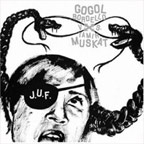You never knew you loved... It's gypsy punk time
When most people walk into a punk show, there are certain mainstays they expect to see: a bass, one or more electric guitars, and a drum kit. Accordions, fiddles, and trumpets would generally seem entirely out of place.
However, there is always an exception to the rule. Gypsy punk is a dynamic genre with as much showmanship as the finest punk cabaret but also a strong injection of traditional Romani instrumentation and music.
The term predates, but was popularized by a Gogol Bordello album entitled Gypsy Punks: Underdog World Strike, released in 2005. Lead singer Eugene Hutz revels in the distinctive nature of his band's sound, amused by audiences who walk into what they expect to be a conventional punk show (assuming such a thing exists) wondering, “What the fuck are these guys gunna do with a violin and accordion?” and happy to “show them what the fuck we're gunna do with a violin and accordion.”
The music is equal parts sound and showmanship, with many performers actually incorporating first-generation experiences rather than transmitted histories. The band members also often dress the part, sporting handlebar mustaches and wearing clothes that speak to a disheveled punk aesthetic while stirring echos of ethnic roots.
The music is unusually melodic, trading off heavily distorted guitars that provide equal parts tone and pitch in favour of acoustic instruments that rely on texture and timbre for a dimensional sound.
The genre's existence only traces as far back as the 1990s, with most of its mainstream forays having only been made within the last decade. Even with 20 years of growth under its belt, the genre remains obscure. The genre has a relatively small number of associated acts, meaning there are few bands available to popularize the style.
DeVotchKa: combining several traditions, including Romani, Greek, Slavic, bolero, and mariachi, DeVotchKa got their start backing burlesque shows before moving to the front of the stage. Their seven minute epic How it Ends is the title track from their 2004 release, and peaked just one slot below the UK Top 100 Singles chart.
However, there is always an exception to the rule. Gypsy punk is a dynamic genre with as much showmanship as the finest punk cabaret but also a strong injection of traditional Romani instrumentation and music.
The term predates, but was popularized by a Gogol Bordello album entitled Gypsy Punks: Underdog World Strike, released in 2005. Lead singer Eugene Hutz revels in the distinctive nature of his band's sound, amused by audiences who walk into what they expect to be a conventional punk show (assuming such a thing exists) wondering, “What the fuck are these guys gunna do with a violin and accordion?” and happy to “show them what the fuck we're gunna do with a violin and accordion.”
The music is equal parts sound and showmanship, with many performers actually incorporating first-generation experiences rather than transmitted histories. The band members also often dress the part, sporting handlebar mustaches and wearing clothes that speak to a disheveled punk aesthetic while stirring echos of ethnic roots.
The music is unusually melodic, trading off heavily distorted guitars that provide equal parts tone and pitch in favour of acoustic instruments that rely on texture and timbre for a dimensional sound.
The genre's existence only traces as far back as the 1990s, with most of its mainstream forays having only been made within the last decade. Even with 20 years of growth under its belt, the genre remains obscure. The genre has a relatively small number of associated acts, meaning there are few bands available to popularize the style.
DeVotchKa: combining several traditions, including Romani, Greek, Slavic, bolero, and mariachi, DeVotchKa got their start backing burlesque shows before moving to the front of the stage. Their seven minute epic How it Ends is the title track from their 2004 release, and peaked just one slot below the UK Top 100 Singles chart.
 Gogol Bordello: arguably the most well-known band in the genre, the core members of this group expatriated from their Eastern European countries of origin and gathered in New York. They've been featured on several Warped Tour compilations, including the 2007 edition which featured the track 60 Revolutions.
Gogol Bordello: arguably the most well-known band in the genre, the core members of this group expatriated from their Eastern European countries of origin and gathered in New York. They've been featured on several Warped Tour compilations, including the 2007 edition which featured the track 60 Revolutions.













